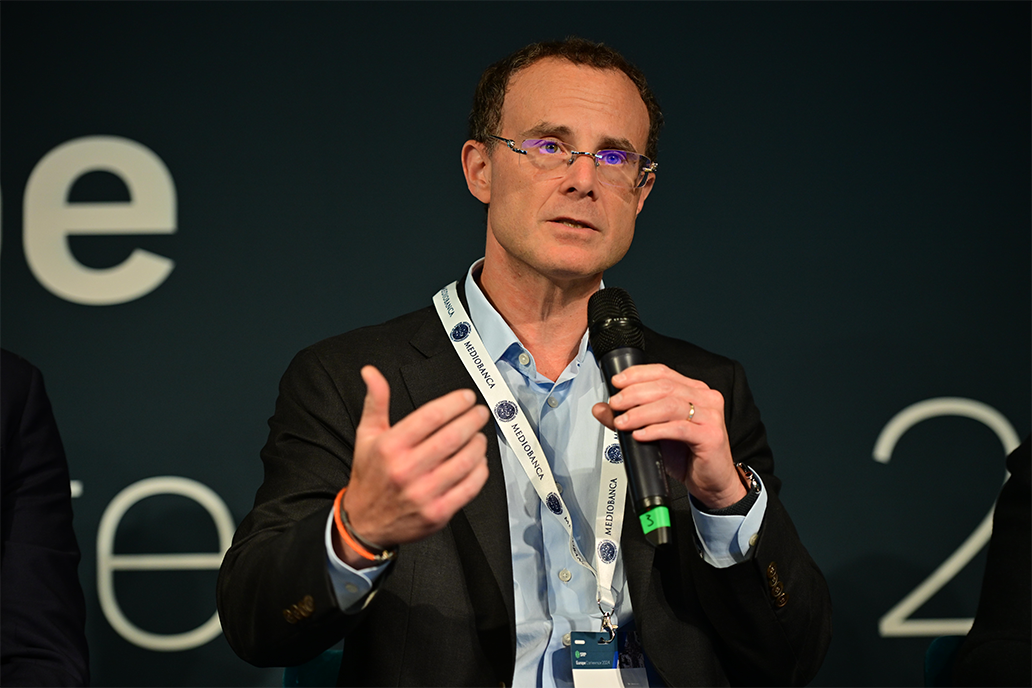The data and index provider took the Best Smart Beta Index provider award at this year's SRP Europe 2024 conference.
MSCI released in 2023 several smart beta thematic strategies that reflected investors' shift from single themes towards dynamic selection.
Investors and clients are not interested in repetition but in new and innovative ways to gain market exposure - Stephane Mattatia
The MSCI Economic Regime Allocator Index, developed in partnership with alternative data specialist QuantCube Technology, includes US and world versions as well as optimised risk control options targeted at structured products, and complements the index provider's thematic index range which includes strategies such as the Smart Security and Defense Index, MSCI Life Sciences Indexes, MSCI Hydrogen and Future Fuels Index, MSCI Future Logistics Index and MSCI Extreme Weather Industrial Solutions Index.
According to Stephane Mattatia, global head of thematic indexes and derivatives licensing at MSCI, the shift in demand in exposures brought the concept of thematic rotation into the spotlight for the index provider which has built an index series that invests in the most popular themes each month, based on positive sentiment in the media.
"Investors and clients are not interested in repetition but in new and innovative ways to gain market exposure," Mattatia told SRP. "Most investors know the MSCI World is a great index to get global exposure to equity markets, but there is always an appetite for new strategies to achieve their goals."
To remain competitive in the structured products market, index providers "must be able to bring new ideas to the table and give structuring desks with new ways to measure the markets", added Mattatia.
"That is what we saw in 2023 when some old concepts like geopolitical pressures and the global macro economy made it back to the top of the market's agenda," he said.
Has the macro-economic environment brought new opportunities to develop smart beta strategies that can extract value from the market in different ways?
Stephane Mattatia: Against this backdrop, we saw an opportunity around rotation, as in the current environment, investors cannot really take static positions for several years. There is a lot of uncertainty around the long-term performance of several asset classes and investors want to factor this in when building their investment portfolios.
Clients appreciate new smart strategies and the work that goes behind the scenes, but their validation is not a given - Stephane Mattatia
Macro economy is back, after 15 years of absence. I think that the younger generation entering the market post the great financial crisis (GFC) did not know what inflation was ! So, there are now several moving parts in the current environment that must be considered when building investment strategies, such as inflation, growth, monetary policy. You expect the current business cycle to go through different regimes over time, which creates expectations for agile algorithms that will allocate across assets classes, equity sectors, factors, or even countries.
Which MSCI smart beta strategies drove activity in 2023?
Stephane Mattatia: One of the most successful indexes for us in 2023 was based on thematic rotation. The index rotates between 25 MSCI thematic indexes based on market sentiment driven by news. The algorithm behind the index, run by MKTMediaStats in Boston, detects which themes are most prominent in the news and applies a rotating approach.
The back-testing shows outperformance versus a simple equally weighted basket of all themes. Our research team did a lot of work to understand this outperformance and differentiate it from classic price momentum. Finally, when we compared it with price momentum, we realised that sentiment momentum was independent, and often stronger, than price momentum. We see sentiment as a kind of new factor, which can be used in a smart way to offer new opportunities around thematics.
Some product providers we met in 2023 were cautious with the thematic tag because some of the investment themes of the previous year did not stick around for very long. Products linked to Metaverse strategies drove significant inflows with some products collecting around US$1 billion in 2022, but a few months later generative AI came to the fore and all the money flew out of Metaverse, leaving some ETFs empty.
Does this mean there could be a shift away from thematic exposure?
Stephane Mattatia: We have seen that single thematic assets can be volatile, but at the same time people want to be invested in thematics that are relevant to them, in emerging themes such as genomics or biotech. The problem is that the traction of some thematic can change very quickly and people don't want to change their investments every two months.
Our thematic rotating strategy answers this need and was very well received. It has been used in Europe (where we also sold it as a pure ESG version) and in APAC, where risk control and local versions were developed. We are also discussing the creation of listed products (ETF and ETN) and FIA-friendly versions for the US.
There is a lot of upside in the structured products market for us because there is a need for diversification and new ways to access the market beyond traditional national indexes - Stephane Mattatia
This success across the regions and across the investment vehicles does not happen so frequently and validated our view that rotation answered investors' needs. There is a good understanding of what rotation can achieve in general. The CAPE Shiller Index family helped investors to understand sector and business cycle rotation and move beyond factor rotation which has never been as popular with retail investors in Europe. In the US, you have a very strong factor culture and rotation is also a concept that is relatively intuitive - from a macro or market perspective, there's always dynamics that may push or drive activity towards specific areas of growth.
Which other MSCI smart beta indexes deployed to the market in 2023 would you highlight?
Stephane Mattatia: Another rotation index that has gained traction over the last few months is not focused on themes but on multi asset universe. This strategy which we developed with data from QuantCube Technology is a good example of how to leverage new data. In this case, the real time estimation of GDP and CPI across the globe allowed us to build a strategy that rotates across asset classes and goes beyond traditional rotation strategies that were based on official data.
We've seen time and time again that rotation strategies based on official figures were sometimes disappointing because when the data is released, it's too late to implement. Markets move very fast. It took us some time to fine tune the strategy and present it to clients as it is based in a totally new concept. Ultimately, we licensed this concept both in APAC and in the US, for private banks and FIA clients.
Clients appreciate new smart strategies and the work that goes behind the scenes, but their validation is not a given, they also want out of sample performance and that can take some time to show.
We have revisited some clients that were not convinced after first visit but have changed their view when we showed the performance over the previous year. For us, this was also a lesson as our passion and resilience paid off. Convincing structured products desks is not easy - if you come up with something relatively disruptive, they will challenge you and will want to see real performance and not simply the novelty elements of the strategy.
What is your outlook for the remainder of 2024? What is on MSCI's roadmap for this year?
Stephane Mattatia: The market expects that rates will drop at some point which should be good for many asset classes. There is also more appetite in general for multi asset and long/short type of strategies because people saw how long-only strategies suffered in recent times. We are looking at developing new long-short multi asset smart beta strategies.
On the QIS side, we serve the market in two dimensions. On one hand, we license our data to investment banks that are building their own QIS strategies – this includes factor data, as well as ESG and other thematic data. On the other hand, we see more appetite from the buy-side for QIS absolute return style indexes but not as sophisticated as pure QIS which is targeted at asset owners. QIS is evolving too and bodes well with the shift towards customisation we see in the structured products market.
Our structured products business has doubled over the last five years and continues to grow. There is a lot of upside in the structured products market for us because there is a need for diversification and new ways to access the market beyond traditional national indexes. We intend to continue growing our footprint and bring new strategies to the market that can add value to investors.
Do you have a confidential story, tip, or comment you’d like to share? Write to info@structuredretailproducts.com.


